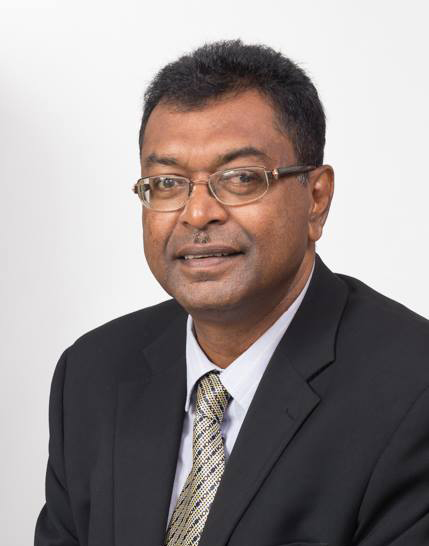With the issuance of two new trawling licences shrouded in secrecy, APNU+AFC Member of Parliament Khemraj Ramjattan yesterday said that he will be seeking answers from the National Assembly.
Ramjattan told Stabroek News that he will today be delivering the questions to Clerk of the National Assembly, Sherlock Isaacs, so that the nation can get clarity on what he believes is a “serious issue on the sustainability of Guyana’s seafood”.
This newspaper understands that the licences were given to a local company which is financed by a large Chinese company.
“I am taking my questions to the Clerk, asking that the Minister of Agriculture tell the people of Guyana, who are the recipient of the licences because this is a sensitive issue on the sustainability of the species of shrimp here. If we want to continue, we have to do it in a sustainable way or there will be none left to export,” Ramjattan said.
In mid-November, the Guyana Association of Trawler Owners and Seafood Processors (GATOSP) brought the issue to the fore when it disclosed that the two licences had been granted.
The organization has since protested, saying that the approval of the licences is in contravention of sustainable fishing practices.
Since the protest, the Ministry of Agriculture has initiated a probe to determine the circumstances under which the approval was given but has said nothing else.
Minister of Agriculture Zulfikar Mustapha had last week told this newspaper that he was arranging a meeting with the group to discuss the issue.
According to Ramjattan, government should make its position clear because the plundering of this nation’s seafood will impact its sustainability and the issuance of the licence “is a major setback to the achievements made to ensure “shrimping” is a sustainable industry.
He credited the PPP/C for initiating a seasonal period for catching shrimp and said that when the APNU+AFC government took office in 2015, it built on what was established. It was under the previous PPP/C government, he recalled, that three of this country’s “largest players in the industry”- Noble House Seafoods, Pritipaul Singh Investment and Gopie Investment, were asked to reduce operations by 30% and cut their fleet of vessels to further ensure sustainable practices.
“We had charged three persons because they were violating a lot of the prohibitions in relations to catching seabob shrimps. It was all part and parcel in ensuring there are best practices in this sea bob industry,” he explained.
Tightening
The former Public Security Minister said that his government had invested heavily in tightening and strengthening the capacity of the fisheries department to equip officers with skills for effective monitoring and surveillance.
“We wanted a tightening up of this seabob fishing. We had bought a boat for $99M – an observation monitoring and surveillance vessel for the fisheries department…We had also done major capacity building courses and the personnel on that surveillance vessel, I think two or three of them, had Master’s degrees (as) we had sent them to be trained,” he said.
During the APNU+AFC’s term in office, Ramjattan said that there had been numerous applications for trawler licences but none was granted approval.
Guyana, Ramjattan noted, is one of the largest exporters of seabob in the world and exports approximately 45% of the global demand.
In 2019, he said Guyana exported almost 21,000 metric tonnes and in 2018, 22,000 metric tonnes.
“A lot of people may not know but Guyana is one of the largest exporters in the world of seabob. Forty-five percent of the global seabob export is exported from here annually. This thing has to be looked at very cautiously,” Ramjattan underscored.
He pointed out that under the measures for sustainable fishing they had implemented seasons to allow for spawning.
He noted too that they were preparing to embark on collaboration with the Maritime Administration (MARAD) and the Guyana Energy Agency for oversight of operations.
Should the new operators begin operations, the regulations that are now functioning will serve little purpose “it will go back to basically a free for all situation. And then we will do harm to our fishing industry and that will do harm to our sea bob,” he contended.
Further, the Member of Parliament stressed that there was already a draft seabob fishery management plan and a captain’s code of conduct in the pipeline in 2019 but because of elections preparations, it was not seen through.
Certification from the Marine Stewardship Council, a non-profit organization which safeguards seafood for the future was also being worked out.
GATOSP President, Reuben Charles yesterday informed this newspaper that they had written to the Minister for a second time seeking an urgent audience with him since there are many concerns.
In the first letter dated 19th November, Charles wrote to Mustapha for clarification, warning that new licences could jeopardise the sustainable certification that they had secured from the international Marine Stewardship Council (MSC).
The letter stated that in light of all the management initiatives in place and the low catches of seabob, new licences would be harmful to the sustainable management of fish resources.
It also warned that the MSC could consider this as a breach of the principles associated with the certification granted to GATOSP and revoke it.
GATOSP added that the addition of any vessel to the current licensing agreements is in contravention of the pact that it and the Fisheries Department of the ministry had agreed to.
The GATOSP letter said that members had been alerted of the two new licences after reports circulated in the fishing community. It added that some level of confirmation surfaced afterwards when the supposed holder of the new licences approached the owner of one of the seabob processing plants for an agreement whereby the plant would process the shrimp caught by his vessel.






